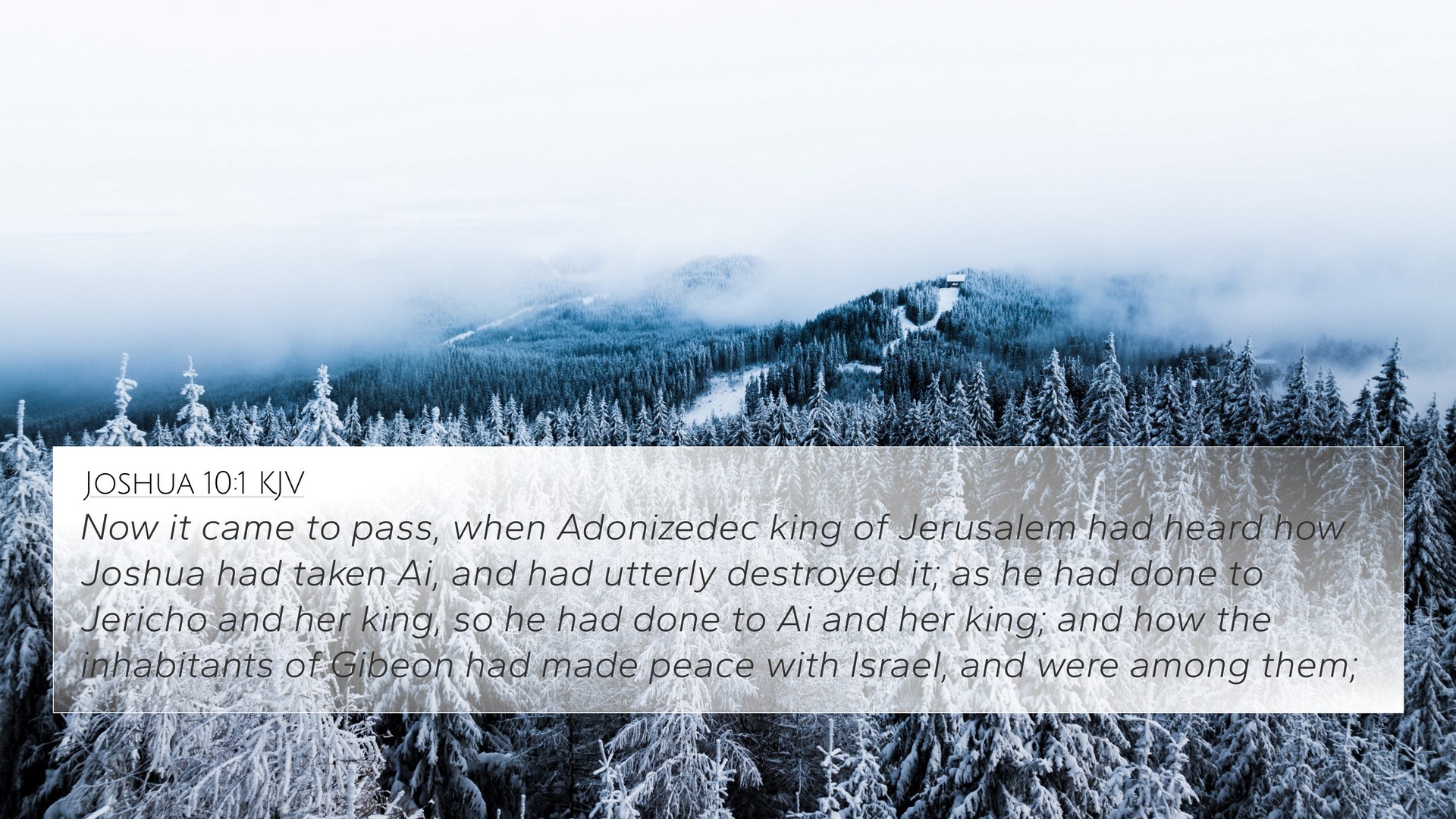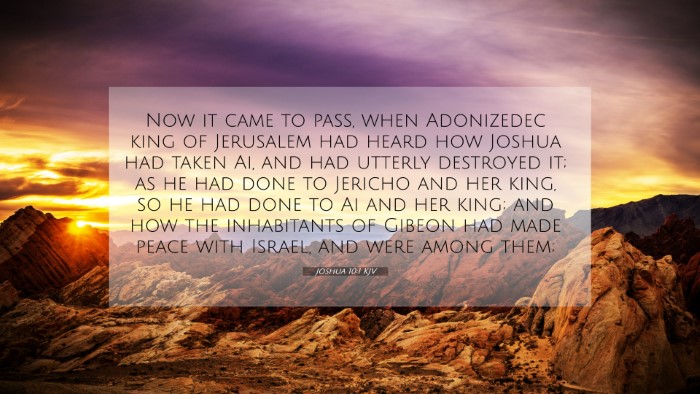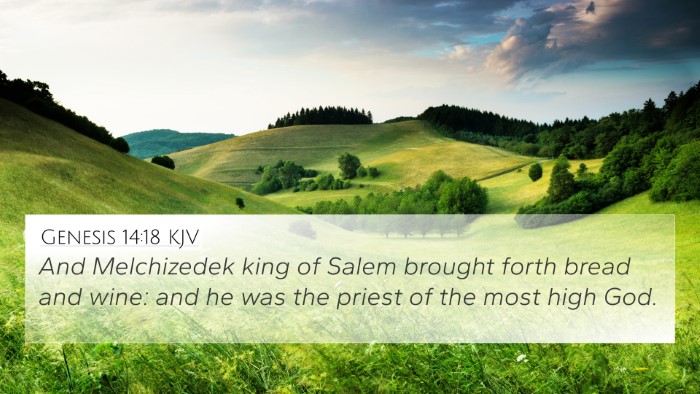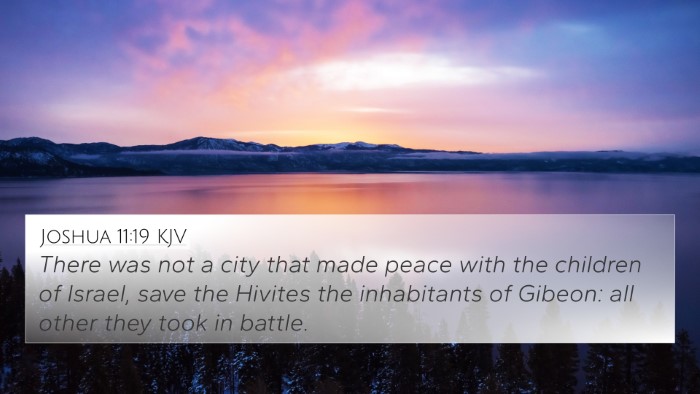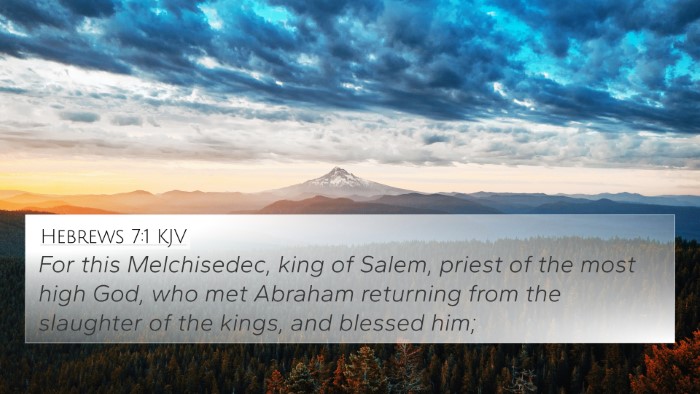Understanding Joshua 10:1
Joshua 10:1 states: "Now it came to pass, when Adonizedek king of Jerusalem had heard how Joshua had taken Ai, and had utterly destroyed it; as he had done to Jericho and her king, so he had done to Ai and her king; and how the inhabitants of Gibeon had made peace with Israel, and were among them," (Joshua 10:1, KJV). This verse plays a pivotal role in the narrative of Israel's conquest of Canaan and sets the stage for further actions against the Amorite kings.
Summary of Commentary Insights
-
Contextual Background: The verse highlights a critical moment in the Israelite conquests. Adonizedek, the king of Jerusalem, becomes alarmed by the rapid success of Joshua and Israel, particularly their victories over Jericho and Ai. This fear reflects the broader reaction of the Canaanite kings to Israel’s divine favor and increasing influence in the land (Matthew Henry).
-
Fear Among the Canaanites: Commentators observe that Adonizedek's anxiety represents a significant theme in the Biblical account—fear leading to coalition amongst the Canaanite leaders. This fear is not just political but also theological, acknowledging the power of the God of Israel (Albert Barnes).
-
Significance of Gibeon's Peace Treaty: The decision of the Gibeonites to ally with Israel, as referenced, is significant. It triggers a response not just from Adonizedek but also influences the wider Amorite kings, showcasing the dynamics of alliances in the ancient Near East (Adam Clarke).
-
Illustration of Divine Strategy: Joshua's victories are seen as manifestations of divine strategy; the mention of Ai’s destruction serves to remind the reader of the necessity of following God’s commands in achieving success (Matthew Henry).
Bible Verse Cross-References
This verse connects to several other significant Biblical passages:
- Joshua 9:15: The league made with the Gibeonites highlights the nature of Israel's conquests.
- Joshua 10:5-6: This describes the response of the Amorite kings to Gibeon’s defection to Israel.
- Deuteronomy 7:2: God commands Israel to destroy the inhabitants of the land they are entering.
- Joshua 8:1-2: The Lord instructs Joshua about the conquest of Ai, showcasing God's guidance and strategy for Israel’s victory.
- Exodus 23:27: God's promise to put fear and dread of Israel upon the nations they encounter reflects in Adonizedek's fear.
- 1 Samuel 12:9: Israel’s history of turning to God during times of need underscores the response from surrounding nations when they observed God’s favor towards Israel.
- 2 Samuel 5:6: The capture of Jerusalem later by David ties into the significance of this royal figure in Joshua's time.
- Psalms 127:1: The theme of divine involvement in building and guarding emphasizes the need for God's favor in their endeavors.
- Genesis 14:18-20: References earlier conflicts involving kings in the area, providing context for the territorial struggles.
- Hebrews 11:30-31: Highlights the faith of Israel in overcoming Jericho, tying back to the God-given victories mentioned in Joshua.
Thematic Connections
The verse serves as a focal point for several broader themes in the Scripture:
- Divine Sovereignty: The realization that God is orchestrating the events leads to both fear and respect from the surrounding nations.
- Faithfulness and Obedience: Israel’s prior successes hinge upon their adherence to God’s commands, a recurrent theme throughout Joshua's narrative.
- Covenant Relationships: The alliance with the Gibeonites raises questions about loyalty and trust within covenants made with God.
- Conflict and Conquest: The transition from peace to battle as a consequence of choices made reveals the volatility of their situation.
- Historical Memory: Remembrance of former victories empowers the Israelite identity and faith moving forward.
Conclusion
Joshua 10:1 is a rich verse that encapsulates themes of divine intervention, the nature of fear among nations, and the unfolding of God’s plan for Israel. By exploring cross-references, one can grasp the interconnected narratives that illustrate the profound historical and spiritual significance of this text. Utilizing tools for Bible cross-referencing, readers can further their understanding of how individual verses connect to the larger tapestry of Biblical events and themes.
